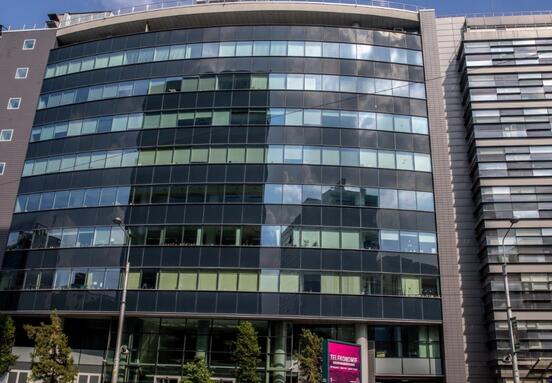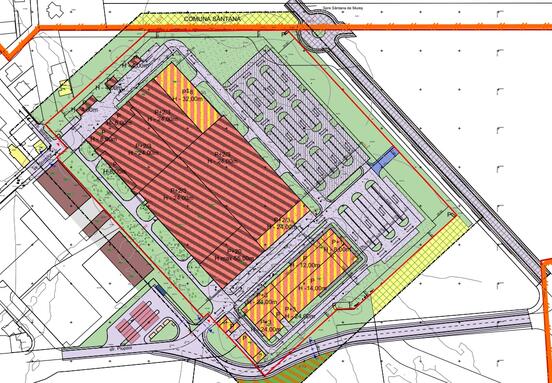Against the backdrop of a fluctuating economy and the continuing uncertain state of building permits in Bucharest, companies continue to rely on a cautious strategy to ensure that in the next real estate cycle they will benefit from the best terms and conditions negotiated for office space. Two thirds of the transactions concluded in the first part of 2024 are renegotiations/renewals, a trend that started in 2022 and is still taking effect.
A compelling example of this is the renegotiation transaction of more than 29,000 sqm carried out by Genpact in Hermes Business Center under the advice of CBRE, which holds at the end of this first quarter a market share of 34% in Bucharest and 29% in Romania being the leader in the office sector. This transaction is the largest in the last 10 years in Bucharest, alone accounting for almost a quarter of all rental transactions in Romania in the first quarter. A total of 97,400 sqm were transacted in Bucharest during this period, with take-up transactions (rental transactions including new demand and relocation) totalling just over 33,000 sqm, similar to the area transacted in Q1 2023.
Large companies are still consistently pursuing their long-term real estate strategy with the ubiquitous flexible working component. Technology and services continue to be the dominant components of office demand, despite the propensity of these sectors to work from home, accounting for over 66% of total leased space in Q1 in Bucharest.
At the same time a multitude of small and medium sized companies are using smart office positioning to differentiate themselves in the labour market, attract talent and create a pleasant and healthy working environment for employees. The dynamics of the office market is particularly supported by this type of companies: 32 transactions out of 56 in the first quarter in Bucharest are for modern office space up to 1,000 sqm, and 25 of these are relocation or new demand rental transactions.
"We're in a time of opportunity for companies that choose to work with professionals who can make them stand out. There is momentum across all types of premises, across all types of tenants. If we look at the top 5 rental transactions of this first quarter, we see both records of the last few years and spaces of just over 4,000 sqm." explained Alina Calciu, Head of A&T Services Office Occupiers at CBRE Romania, and holder of the largest renegotiation deal in the last 10 years.
Three trends coagulated after the first quarter of 2024
1. A healthy vacancy rate. Companies' focus on making workspace more efficient in the context of hybrid working has increased the vacancy rate from 9% to 13%. But this has opened a new category of space: fully furnished offices, ready for immediate plug & play take-up. These are suitable for a medium-sized tenant (1,000 - 1,500 sq. m) looking for a quick, hassle-free, and budget-friendly solution. This is a dynamic area for transactions in the coming period.
2. Planning ahead. The lack of new supply has led larger contracts (>10,000 sqm) to plan for the next rental cycle. This creates opportunities for future developments ranging from individual offices to business or mixed-use campuses.
3. Flexibility is key. Hybrid working is still evolving, so all companies are looking to secure a flexible future. All our discussions go beyond leased space and outline alternatives in the same building or in close proximity. We map out options for additional space, additional meeting rooms, conference centres, coworking facilities, amenities.
"The market for modern office space is one dominated at the moment by a lack of new supply, a reality that is contributing to some extent to pressure on rents. However, this pressure is compounded by other components such as the cost of development, dictated by high interest rates and inflation in recent years, reflected in high indexation rates. For the few brave developers starting projects in this period, the construction cost structure will certainly indicate higher rents for new, sustainable, and modern projects delivered in the coming years." staid Daniela Gavril, Head of Research at CBRE Romania.
The lack of deliveries has also generated an anticipated but now emerging direction, spurred on by the growing conversation around ESG criteria: investing in buildings delivered long ago to create new, sustainable space to current standards, often revitalising a property in a good location but in a sub-market condition.
Examples of this are the investments made by developers such as Hagag Development in the Downtown area by renovating and repositioning various properties, or One United Properties with One North Gate being converted into a residential building. We also have this small wave of universities in Bucharest and Cluj buying up office buildings to expand their university campuses, or buildings in protected areas that they want to convert into hotel functions, such as Mondrian Hotels at One United.
However, there is also a cost associated with these renovations that can be high or poorly estimated, so it is wise and recommended for all sellers to have a technical due diligence carried out by professionals for the buildings they wish to sell, to eliminate protracted discussions on subsequent Capex investments.








